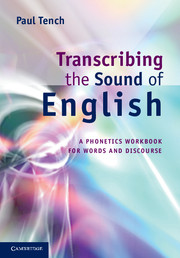Part I - Words . . .
Published online by Cambridge University Press: 05 June 2012
Summary
Why transcribe?
It is an unfortunate feature of the English language, that the way its words are spelt does not always match the way its words are pronounced, in the simple and systematic way of other languages. For instance, in most accents of English, the letter <a> is not pronounced the same in the two words tall and tally; and although the two words tally and ally are spelt alike, they are not pronounced alike – they do not rhyme. There are, in fact, two sides to this mismatching of spelling and pronunciation: a single vowel letter of the alphabet can represent at least two vowel sounds; and a single vowel sound can be represented by at least two different spellings. Another example is the double <o> in brood and brook – two different vowel sounds, but the same spelling; and brood (what birds do) and brewed (past tense of the verb brew) – two different spellings, but the same vowel sound. In fact, it is not too difficult to think of ten ways of pronouncing the use of the letter <a> in spelling, and ten ways of pronouncing each of the other vowel letters. Equally, it is not too difficult to think of ten ways of spelling most of the vowel sounds. This represents an enormous task for a child learning to read and write in English as their mother tongue, and similarly, a tricky task for those who learn English as an additional language.
- Type
- Chapter
- Information
- Transcribing the Sound of EnglishA Phonetics Workbook for Words and Discourse, pp. 3 - 5Publisher: Cambridge University PressPrint publication year: 2011



